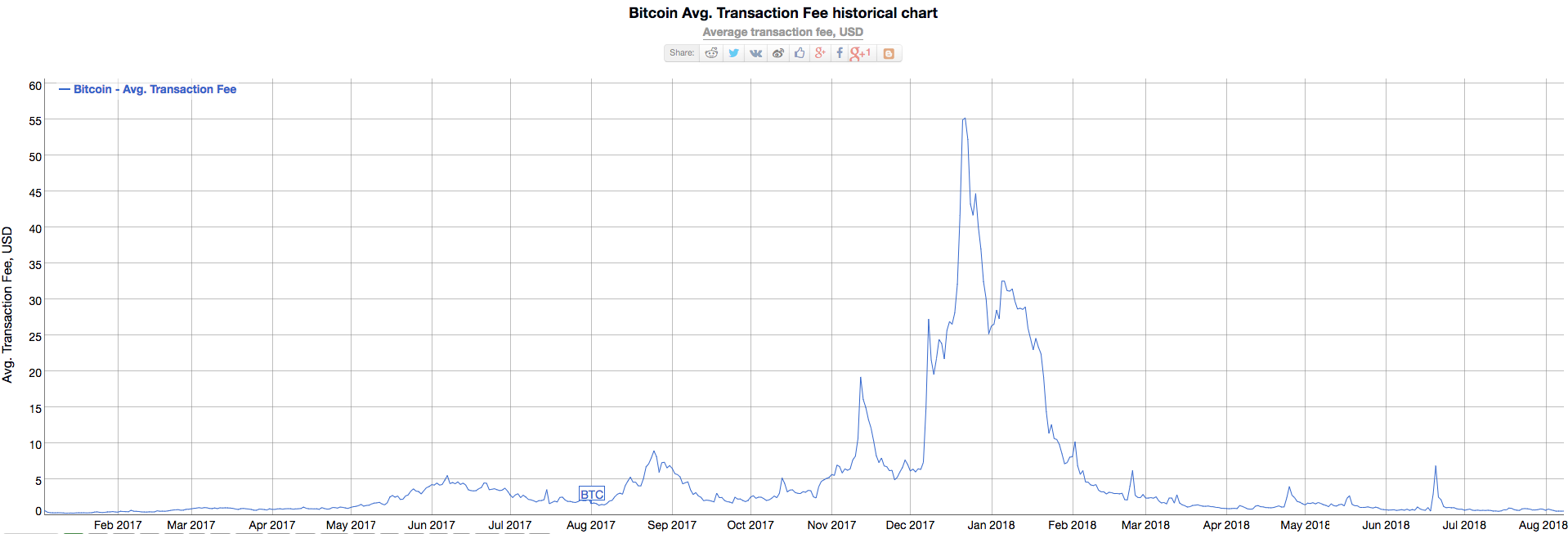Maybe one of the issues researchers are trying to solve in blockchain protocols like Bitcoin or Ethereum is removing / decreasing "transaction fees". However, if we compare blockchain transaction fee with traditional centralized bank protocols (Visa or MasterCard) which one has more affordable transaction fee? (Or which one is more expensive? blockchain (bitcoin/Ethereum)? or Visa/MasterCard?)
2 Answers
Bitcoin's blockchain transaction fees are market-based, so they fluctuate based on what fees miners are willing to mine:
Currently, they are around $0.75.
First of all, one major difference is that Bitcoin's fees are flat (not based on the transaction amount) and Visa or Mastercard's interchange fees are percentage-based. This means that the fee for larger transactions on the Bitcoin network are the same for very small transactions. You can find Visa's fees, for example on their website: Visa Interchange Rates, which depend on the type of transaction, but they generally are over 1%. Based on that, any transaction above $75 will be cheaper on the Bitcoin blockchain.
Now, there is a secondary layer network on Bitcoin called the Lightning Network, where you can do microtransactions, which are not all immediately posted to the blockchain, but can have drastically lower fees because nodes have to compete to route payment channels, see Bitcoin Lightning Network Creators: Fees Will Be Effectively Zero. The only time you pay the blockchain tx fee is when the channel is created or closed.
-
1If fees for debit card transactions are capped at 0.2% in the EU, does that mean that debit cards in the EU are cheaper than Bitcoin for any transaction under $375? Unlike bitcoin, the purchaser doesn't pay any transaction fee when purchasing using a debit-card (you can argue that indirectly they do but often retailers cannot charge cash purchasers a different price so this is rather moot). Commented Aug 10, 2018 at 20:23
-
1Yeah if that's the case, and you don't use LN. Purchaser doesn't pay the fees directly, but the merchant can charge the customer less if they pay in bitcoin, for example. But, the merchant would also have to factor in the cost of transferring that to fiat if that's required.– JBaczukCommented Aug 10, 2018 at 20:27
if we compare blockchain transaction fee with traditional centralized banks protocols (Visa or MasterCard) which one has more affordable transaction fee?
That isn't necessarily a relevant comparison. At least, not for me.
I make most purchases online using a debit card. The bank doesn't charge me a fee for this type of transaction.
I make some regular payments (monthly bills etc) using online banking. The bank doesn't charge me a fee for those transactions. I use something called the Faster Payments System (FPS) which usually takes a few minutes for the payment to show up in the recipient's account. The banks charge each other a flat fee (GBP 0.03) per transaction but that fee doesn't appear anywhere in my bank statements.
Since Bitcoins were conceived, at least partly, as an electronic equivalent to fiat cash, you can also compare the Bitcoin transaction fee with the transaction fee you pay when purchasing something using banknotes and coins - again zero.
So it is only certain forms of payment that result in fees for the purchaser using payment systems supported by banks. In many cases the apparent fees to the purchaser are zero. You can avoid most transaction fees with a little care.
For businesses or a retailer, fees will be more evident.
For a consumer making a purchase, Bitcoin transactions might only be cheaper where the the transaction
- can wait for several blockchain confirmations or
- is one where the recipient takes the risk of trusting it will confirm and
- involves no conversions to fiat (e.g. retailer has a bitcoin wallet)
- involves no use of a BTM (Bitcoin ATM)
- involves no payment processor (e.g. Bitpay etc)
- is a higher value transaction
- where you cannot pay in fiat banknotes
- where you cannot pay using fiat online-banking or fiat debit card
- where the alternative would be a fiat credit-card that you don't pay off in full when due -- or some other relatively expensive method that is usually avoidable in my part of the world.
of course there are costs to running any payment system, however for payments in fiat currency, in my part of the world, those costs are paid indirectly by everyone regardless of their chosen method of payment - so they are mostly not a factor in choice of payment method.

